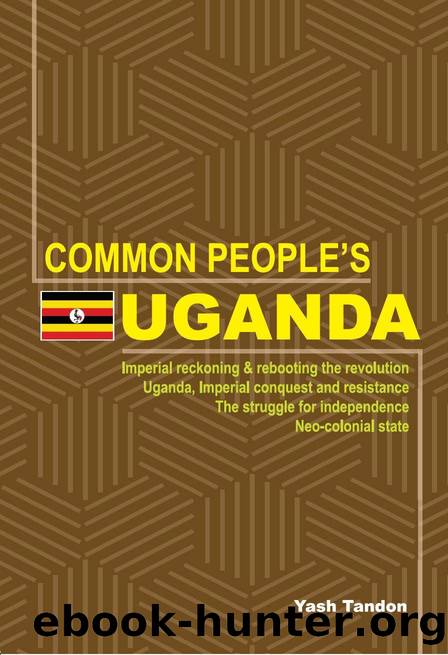Common People's Uganda by Yash Tandon

Author:Yash Tandon [Tandon, Yash]
Language: eng
Format: azw3
Publisher: UNKNOWN
Published: 2019-05-03T16:00:00+00:00
Uganda’s Heads of State and Government from Independence to date difficult questions: what is a nation? And what is national interest? Without going too much into it at this stage, let me simply say that ‘national interest’ is a shared experience coming out of collective suffering and persecution … but also more mundane motives like collective greed, and the corporate profit motive. Taking, for our purposes, the African experience of suffering and persecution over the last 500 years, I would say that taking up arms to fight against oppression and exploitation may be ‘justified’ (or you may feel it IS justified) on moral and political grounds. Yes, but that too, in my view, has to be not a decision made by an individual but by a collective where the masses – who pay the price for what is often called ‘structural violence’117 – are actively involved in the decision of whether or not to take up arms.
117 Structural violence is a form of violence wherein some social structure or institution prevents people from meeting their needs for survival and basic human rights. It is a term commonly credited to Johan Galtung, from his article ‘Violence, Peace, and Peace Research’, Journal of Peace Research, Vol 6, No. 3 (1969), pp 167-191.
I have faced this dilemma for decades when I joined a movement that decided to take up arms against the oppressive regime of Idi Amin who, as analysed earlier, was backed by imperial interests. I was not averse to the movement’s decision; but I had two conditions – one personal and the other collective. The personal was that I would not take up a gun myself, preferring to take the path of ‘active nonviolent resistance’ against the oppressive state.118 And my second condition was collective – that the movement should take up arms provided the masses join in.119 I must add that this was not then so expressly stated as I now explain, but my concerns were fully understood by my comrades.
This is my perspective. In the following chapters, I draw mostly from my own experiences over the last nearly sixty years of engagement in these issues – both at an intellectual level and in practice. This implies, of course, that I have no intention of persuading the reader to agree with me. That only he or she must decide drawing from his or her own experiences.
Download
This site does not store any files on its server. We only index and link to content provided by other sites. Please contact the content providers to delete copyright contents if any and email us, we'll remove relevant links or contents immediately.
| Africa | Americas |
| Arctic & Antarctica | Asia |
| Australia & Oceania | Europe |
| Middle East | Russia |
| United States | World |
| Ancient Civilizations | Military |
| Historical Study & Educational Resources |
Pirates of Somalia by Jay Bahadur(1115)
Out of Africa by Isak Dinesen(661)
A History of the East African Coast by Charles Cornelius(415)
Dreams in a Time of War: A Childhood Memoir by Ngugi Wa Thiong'o(413)
Swahili Port Cities by prita meier(384)
I Am Evelyn Amony by Evelyn Amony(381)
Aagaard's African Adventures by Finn Aagaard(371)
Where Soldiers Fear to Tread by John Burnett(362)
Mugabe: Power, Plunder, and the Struggle for Zimbabwe's Future by Martin Meredith(314)
The Addis Ababa Massacre by Campbell Ian;(306)
Inside the Hotel Rwanda by Edouard Kayihura(305)
Mau Mau Rebellion by Nicholas van der Bijl(301)
Terrorism, Betrayal, and Resilience by Prudence Bushnell(281)
The First Victory by Andrew Stewart(261)
Terrorism, Betrayal, and Resilience: My Story of the 1998 U.S. Embassy Bombings by Prudence Bushnell(256)
Common People's Uganda by Yash Tandon(232)
Air War East Africa 1940-41: The RAF Versus the Italian Air Force by Jon Sutherland & Diane Canwell(221)
UNDERSTANDING CONTEMPORARY ETHIOPIA by GÉRARD PRUNIER; ÉLOI FICQUET(206)
